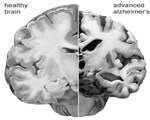Alzheimer's patients who have a close relationship with their caregivers show a slower decline in their mental and physical function over time.

Alzheimer's patients who have a close relationship with their caregivers show a slower decline in their mental and physical function over time.
Alzheimer's dementia (AD) remains a major public health problem and efforts have been made to identify factors that might delay or prevent its onset. These factors include several potentially disease modifying pharmacologic interventions but less work has focused on non-pharmacological factors such as caregiving environment or practices that may delay the progression of symptoms in AD.
Researchers in America studied 167 people who had developed dementia to examine the effect of caregiver - care recipient relationship closeness on cognitive and functional decline in Alzheimer's disease. They followed the participants for 20 months and all were being cared for by a spouse or an adult child. All study participants were 65 or older at the study's outset. The researchers determined caregiver-patient closeness by presenting the caregivers with a series of statements about their relationship with the patient.
It was found that the effect of having a close relationship with one's caregiver approached the impact of taking medications that can slow the progression for the disease. The patients with spouse caregivers showed slower physical and mental decline than those being cared for by adult children. And the closer the relationship was, the slower the decline.
People may be more willing to care for a husband or wife than for a parent, given that they've already agreed to stick by them in sickness and in health. Caregivers who feel closer to their charge may also be more likely to spend time engaging with them and making them feel important and loved, rather than making the person sit in front of the TV.
The findings suggest that people's brains stay healthier if they are more socially and cognitively active. The more loving caregivers might possibly be engaging the person with Alzheimer's disease in socially and cognitively stimulating activities that may in turn keep the brain active and slow the rate of cognitive decline.
The researchers suggest that taking steps to strengthen the relationships between Alzheimer's patients and their caregivers could be helpful in slowing decline in AD.
DoctorNDTV is the one stop site for all your health needs providing the most credible health information, health news and tips with expert advice on healthy living, diet plans, informative videos etc. You can get the most relevant and accurate info you need about health problems like diabetes, cancer, pregnancy, HIV and AIDS, weight loss and many other lifestyle diseases. We have a panel of over 350 experts who help us develop content by giving their valuable inputs and bringing to us the latest in the world of healthcare.












